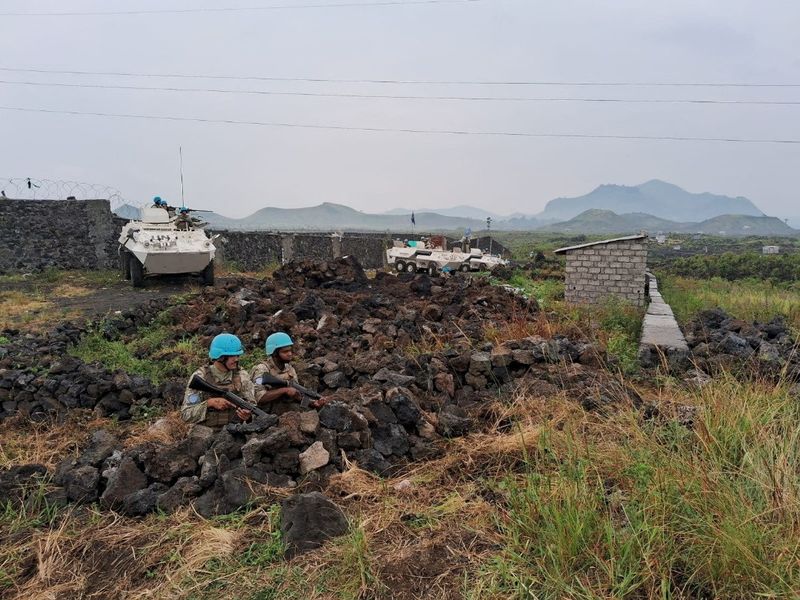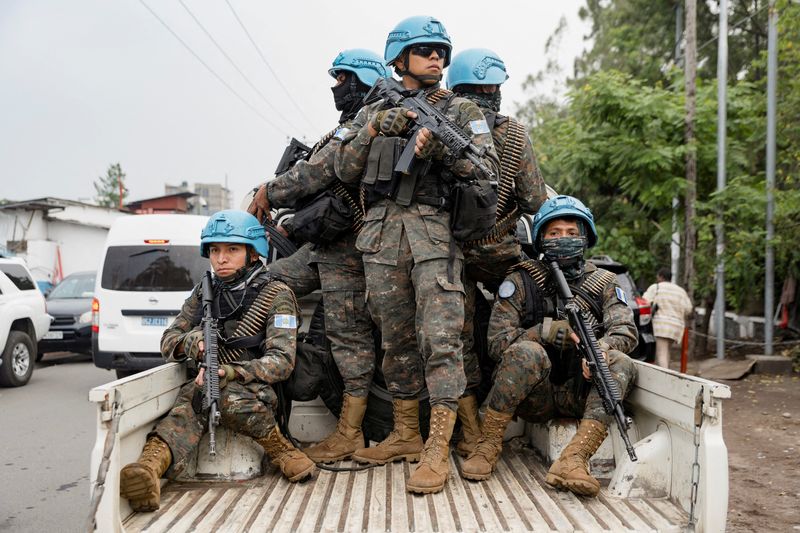GOMA, Democratic Republic of Congo (Reuters) -Congolese rebels said on Sunday they had taken Goma, the biggest city in the east of the mineral-rich country, after a lightning advance that has forced thousands of people to flee and fuelled concerns of a regional war.
"We have taken Goma and have ordered soldiers to surrender by 3:00 a.m. local time (0100 GMT)," Corneille Nangaa, leader of the Congo River Alliance that includes the M23, told Reuters.
Reuters could not independently determine whether the city was fully under rebel control. Spokespeople for the Kinshasa government and the army did not immediately respond to requests for comment.
The Rwanda-backed M23 rebels have quickly gained ground this month in Democratic Republic of Congo's conflict-riven eastern borderlands and launched an assault on Goma, the capital of North Kivu province, earlier this week.
By Sunday evening, M23 fighters had pushed past Munigi, an outlying neighbourhood around 9 km (5 miles) from the city centre, three sources told Reuters.
"Goma is in our hands," Nangaa said.
The rebels had earlier ordered defending government forces late on Sunday to disarm and surrender, saying they were preparing to enter and take control.
Nangaa said that following negotiations, the rebels had allowed army officers to leave Goma by boat for Bukavu.
"We gave the (Congolese forces) a 48-hour ultimatum to lay down their arms. The ultimatum has already passed, so we say that they can deposit their military equipment at (U.N. mission) MONUSCO," Willy Ngoma, a spokesman for M23, told Reuters.
He added that surrendering government soldiers were to assemble at one of the city's stadiums ahead of the 3:00 a.m. deadline. A second rebel spokesman posted on X that all boat traffic on Lake Kivu was suspended.
City residents reported hearing scattered gunfire in different areas after nightfall, but it was unclear who was shooting or whether fighting was continuing.
Most of Goma, meanwhile, was plunged into darkness due to a power cut.
With the rebels appearing poised to seize Goma, the United Nations Security Council met earlier on Sunday to discuss the situation, fearing the fighting could spill over into a broader regional war and aggravate one of the world's worst humanitarian crises.
Addressing the council via video link, the head of the U.N. mission in Congo Bintou Keita said M23 and supporting Rwandan forces had penetrated the outer edges of the city.
"Roads are blocked and the airport can no longer be used for evacuation or humanitarian efforts. M23 has declared the airspace over Goma closed," she said.
"In other words, we are trapped."
CONDEMNATION
The United States, France and Britain on Sunday condemned what they said was Rwanda's backing of the rebel advance. Kigali has long denied supporting M23.
Rwanda's U.N. Ambassador Ernest Rwamucyo said his country regretted the deteriorating situation in eastern Congo, but blamed Kinshasa.
"The current crisis could have been averted had (Congo's) government demonstrated a genuine commitment to peace," he added.
The eastern borderlands of Congo, a country roughly the size of Western Europe, remain a tinder-box of rebel zones and militia fiefdoms in the wake of two successive regional wars stemming from Rwanda's 1994 genocide.
Well-trained and professionally armed, M23 - the latest in a long line of Tutsi-led rebel movements - says it exists to protect Congo's ethnic Tutsi population.
Congo's government, however, says the rebels are proxies for Kigali's expansionist ambitions in the region, an accusation the Rwandan government has long denied.
Congo severed all diplomatic ties with Rwanda amid this week's rebel offensive and on Saturday blamed Rwandan snipers for the killing of North Kivu's military governor on the front line a day earlier. Three U.N. peacekeepers - a Uruguayan and two South Africans - were also killed in the last two days.
A spokesperson for Rwanda's government did not respond to a request for comment.
Aid agencies are concerned about the conflict's impact on civilians.

Hundreds of thousands of civilians have fled multiple zones of fighting since the latest M23 offensive began around Goma on Jan. 23, the office of the U.N. humanitarian coordinator said in a statement.
The escalation in violence has also forced the World Food Programme to temporarily pause emergency operations, the agency said on Sunday.
